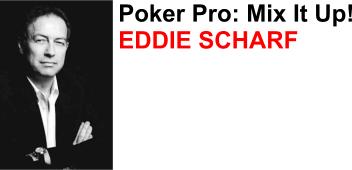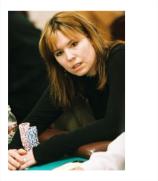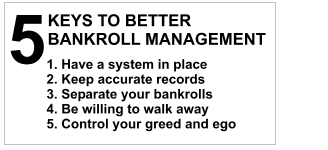Money For Nothing, Flops for Free
ACCEPTING A GIFT
“Don’t accept a gift in the big blind in hold ’em,” Kelly told me years ago. He was wrong.
In hold ’em there are no antes. Without antes or something to replace them, there’s nothing to fight over, and if you’re against wise opponents who are playing perfectly, you should sit hand after hand, badly bored and mumbling mantras about your cattle farm. Finally one hand you’ll find a pair of aces. Logically, only then can you play, because you can defend aces against other intelligent players with equally perfect patience. Against such players, you shouldn’t even start with the second-best hand – a pair of kings. The only time you’d get action would be against a pair of aces and you’d be a decided underdog. All other times, you’d win an empty pot and gain nothing.
That’s why the ante was invented: to give poker players a motive for war. Human nature being as it is, I believe that most players would find reasons to play inferior hands sometimes, even without incentive. They lack patience. But, poker would be a pretty pitiful game without something in the pot to fight over. Well, in hold ’em there isn’t an ante. So what motivates players to enter pots?
NOT OPTIONAL
It’s the blind bets. There are two of them in the seats to the dealer’s left, a small one and a big one, usually twice as large. You must make these bets before seeing any cards. They aren’t optional.
In most hands, there’s going to be a raise before the action gets back to the big blind player. Whether to call or not will be a matter of judgment. But there’s a time when players, like Kelly, often misjudge. And that’s on those occasions when there’s no raise at all. If opponents just call the big blind, there’s a special rule in hold ’em that can get you in all manner of trouble. Normally in poker, if you’re just called, then the betting ends. You move along. But in hold ’em if the player in the big blind isn’t raised, there’s a peculiar option. That player – who’s been merely called – can continue the wagering by doing the raising himself. It’s called the “live blind” rule.
FREE GIFT
 My lesson today is that you should usually treat this situation as a gift when you’re in the big blind. You’re about to see the flop that happens next for free. Yes, it’s sometimes tempting to raise your opponents right out of their chairs, and that sort of aggression is in my nature. But usually, I decline. I accept the gift and see what happens at no cost.
My lesson today is that you should usually treat this situation as a gift when you’re in the big blind. You’re about to see the flop that happens next for free. Yes, it’s sometimes tempting to raise your opponents right out of their chairs, and that sort of aggression is in my nature. But usually, I decline. I accept the gift and see what happens at no cost.
 It’s often bad to try to bully the game when you’re in the big blind with the opportunity to see a free flop, because on all following betting rounds, you’re going to act first (unless it was the small blind who called you). That’s a big positional disadvantage, making it harder for you to take charge. Another caution is that players who just call are frequently laying traps. They’re hoping you’ll raise.
It’s often bad to try to bully the game when you’re in the big blind with the opportunity to see a free flop, because on all following betting rounds, you’re going to act first (unless it was the small blind who called you). That’s a big positional disadvantage, making it harder for you to take charge. Another caution is that players who just call are frequently laying traps. They’re hoping you’ll raise.
Put it all together and you’ll fare better ignoring Kelly’s advice and following mine. Unless you have a powerful hand in the big blind, whenever you’re merely called, think, “Thanks for the present, buddy,” unwrap the flop, and see how you like it.
Doyle Brunson
 TOP POKER ROOMS FOR USA RESIDENTS – Safe, reputable poker rooms that welcome American players
TOP POKER ROOMS FOR USA RESIDENTS – Safe, reputable poker rooms that welcome American players



 There’s lots of choice when it comes to poker networks including the iPoker Network, Microgaming Poker, Chico Poker and WPN Poker Networks. Check out the latest
There’s lots of choice when it comes to poker networks including the iPoker Network, Microgaming Poker, Chico Poker and WPN Poker Networks. Check out the latest About learning poker online:
About learning poker online: On the differences between live and online poker:
On the differences between live and online poker: On finding significant edge online vs live:
On finding significant edge online vs live: In the first level of a multi table tournament, you open in first position with A-10 and are re-raised substantially by a solid player two seats down.
In the first level of a multi table tournament, you open in first position with A-10 and are re-raised substantially by a solid player two seats down. You have sunk down to eight big blinds and are in dire need of winning a hand. You get K-K in late position and an early-position player raises to three big blinds.
You have sunk down to eight big blinds and are in dire need of winning a hand. You get K-K in late position and an early-position player raises to three big blinds. Close to the money, you’ve built up nicely after the K-K vs A-Q hand and are now a big stack. Everyone folds to you and you have K-9(s) in the cut-off seat. The other players have around 10-15 big blinds and there are antes in play.
Close to the money, you’ve built up nicely after the K-K vs A-Q hand and are now a big stack. Everyone folds to you and you have K-9(s) in the cut-off seat. The other players have around 10-15 big blinds and there are antes in play.
 The article compares still-going-strong legend, Doyle Brunson, with savvy Internet players like annette_15 (a 19 year old Norwegian, Annette Obrestad) plus has plenty of colourful input and comment on other pro poker players along the way.
The article compares still-going-strong legend, Doyle Brunson, with savvy Internet players like annette_15 (a 19 year old Norwegian, Annette Obrestad) plus has plenty of colourful input and comment on other pro poker players along the way. Today poker is the third most watched sport on cable television in the United States, after car racing and American football, trumping even NBA basketball…while Britain has its own poker channel.
Today poker is the third most watched sport on cable television in the United States, after car racing and American football, trumping even NBA basketball…while Britain has its own poker channel.
 Now anyone who has sat in at a poker table knows there is skill in poker, but the general consensus has been that there is a preponderance of skill, not that poker is a game that is all skill. Arguments for this have centered on the fact that good players, in the long run will come out winners, but in the short run, anyone can win.
Now anyone who has sat in at a poker table knows there is skill in poker, but the general consensus has been that there is a preponderance of skill, not that poker is a game that is all skill. Arguments for this have centered on the fact that good players, in the long run will come out winners, but in the short run, anyone can win. Poker is a game of skill. It is a game in which the outcome is determined by skill as much as baseball is. Once we understand this, it is clear that poker should be set aside from gambling legislation that deals with games of chance since it clearly is not a game of chance. It is just a matter of getting people to truly and deeply understand the difference between games of skill and games of luck.
Poker is a game of skill. It is a game in which the outcome is determined by skill as much as baseball is. Once we understand this, it is clear that poker should be set aside from gambling legislation that deals with games of chance since it clearly is not a game of chance. It is just a matter of getting people to truly and deeply understand the difference between games of skill and games of luck.
 The biggest problem I see among poker players in cash games is that, pardon the expression, they eat little, and s–t big. In other words, when they sit down at a session and they win, they quit right away instead of playing for a while, and that’s when you should play longer. And when they’re stuck, they play for two days.
The biggest problem I see among poker players in cash games is that, pardon the expression, they eat little, and s–t big. In other words, when they sit down at a session and they win, they quit right away instead of playing for a while, and that’s when you should play longer. And when they’re stuck, they play for two days. Some players, when they get a big stack in front of them, get what I call “chatter chips”. They suddenly want to talk, when before they weren’t talkative.
Some players, when they get a big stack in front of them, get what I call “chatter chips”. They suddenly want to talk, when before they weren’t talkative.
